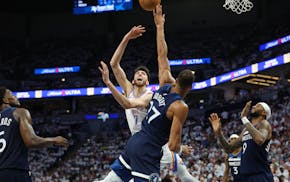The punch lines don't land anymore. Slapstick has been replaced by seriousness.
The Timberwolves were always an easy target for derision because they invited it upon themselves. They put the fun in dysfunction, the oof in goofy.
That was then. This is now. Same team, same name, same arena but totally different organization.
The Wolves have become a well-run, professional operation deserving of all the respect that has been accumulated since reaching adulthood.
Back-to-back trips to the Western Conference finals changes everything that we've ever known about the organization. It still feels so abrupt. Being on this side of the fence, a change of scenery that brings not just good vibes, but increased expectations that stem from being successful.
The goal is sustainable success. Make it repeatable. The Wolves are positioned to achieve that mission because their organizational spine is properly aligned.
They feature one of the NBA's best roster architects, one of the best head coaches and one of the best superstars. Tim Connelly, Chris Finch and Anthony Edwards are excellent at their individual jobs and, when combined as a triumvirate, they serve as a spine that supports a winning operation.
Connelly is fearlessly aggressive as president of basketball operations. He assembled a championship roster in Denver and is working to do something similar in Minneapolis.
He gave up significant assets in a trade for Rudy Gobert because he saw a glaring need. Gobert helped change the culture by transforming the Wolves into one of the NBA's best defensive teams.
Connelly then traded franchise cornerstone Karl-Anthony Towns for Julius Randle because he saw financial and basketball value in the deal. His plan looked clunky initially but makes total sense now. Randle has been the team's most complete player in the postseason and gives the Wolves two players capable of filling the Batman role.
Blockbuster trades aren't successful unless a coach puts the pieces together properly. Finch has proven to be adaptable by bringing two different versions of the Wolves to the conference finals in consecutive years. That's no small feat. The organization is not in this position without Finch's coaching acumen and deft handling of personalities.
An NBA season is never static. Teams have rough patches. Players struggle. Issues flare up. The best coaches understand how to navigate potholes without blowing a tire.
Finch has the right temperament on the bench and locker room. He successfully walks the line between being stern and demanding accountability while also giving his players freedom to be themselves. He knows when to voice displeasure and when to say nothing. His players regularly express appreciation for his influence, none more so than Edwards.
The close, trusting relationship that Finch and Edwards enjoy is paramount in building — and sustaining — a championship contender. Edwards is only 23 years old and already has the most playoff wins in franchise history with 20 — two more than Kevin Garnett.
By trading away Towns, the Wolves announced publicly what had already become obvious in optics, that the Wolves are Edwards' team and every personnel decision must revolve around building the best infrastructure to support him.
Winning in the postseason is a step-by-step process. Individual greatness requires consistency and longevity under the playoff spotlight, something that Edwards is still working to master. But as Randle has stated repeatedly, Edwards is the brightest star in the room.
He is unafraid of the moment, oblivious to high-stakes pressure. He relishes the opportunity to dethrone the NBA's biggest names. He shows respect but doesn't shrink in those who's who matchups.
In the past five playoff series, Edwards has dispatched Kevin Durant, Nikola Jokic, LeBron James, Luka Doncic, Jimmy Butler and Steph Curry.
Granted, for the sake of accuracy, Curry lasted less than one half of one game before exiting with an injury, so it wasn't a full-fledged duel. That one was unlike the others. The result was the same though, a trip to the conference finals.
The Wolves are 8-2 in this postseason and the first sixth seed (or lower) to reach the Western Conference finals since 1995. More than anything, they have proven that they belong in the NBA's top tier of teams. Their business-like response to a five-game series win over the Golden State Warriors revealed their maturity.
This organizational transformation doesn't happen without many contributing factors. But start with the spine. Getting it right with the top executive, head coach and star player represents a winning formula, both in the present and future.
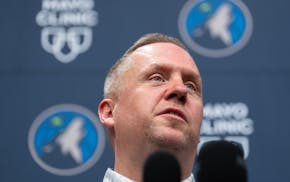
Scoggins: Buckle up Wolves fans, it's going to be a very telling offseason
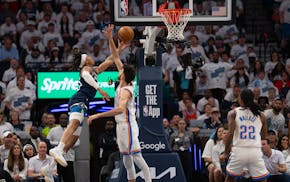
Scoggins: Finch's next challenge is to unleash the Wolves' youngsters
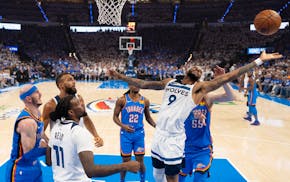
Scoggins: Timberwolves learn just how far behind they are
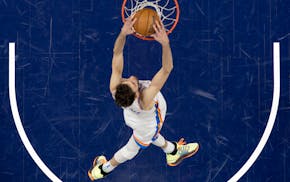
Scoggins: Chet Holmgren is in the right place at the right time
